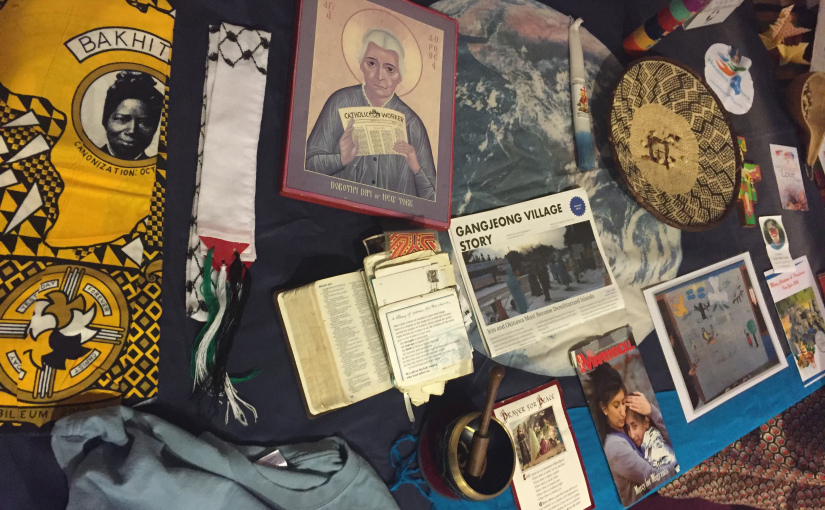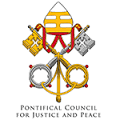Vatican Conference on Nonviolence and Just Peace Report
|
An Appeal to the Catholic Church
to Re-Commit to the Centrality of Gospel Nonviolence
As Christians committed to a more just and peaceful world we are called to take a clear stand for creative and active nonviolence and against all forms of violence. With this conviction, and in recognition of the Jubilee Year of Mercy declared by Pope Francis, people from many countries gathered at the Nonviolence and Just Peace Conference sponsored by the Pontifical Council for Justice and Peace and Pax Christi International on April 11-13, 2016 in Rome.
Our assembly, people of God from Africa, the Americas, Asia, Europe, the Middle East, and Oceania included lay people, theologians, members of religious congregations, priests, and bishops. Many of us live in communities experiencing violence and oppression. All of us are practitioners of justice and peace. We are grateful for the message to our conference from Pope Francis: “your thoughts on revitalizing the tools of nonviolence, and of active nonviolence in particular, will be a needed and positive contribution”.
Looking at our world today
We live in a time of tremendous suffering, widespread trauma and fear linked to militarization, economic injustice, climate change, and a myriad of other specific forms of violence. In this context of normalized and systemic violence, those of us who stand in the Christian tradition are called to recognize the centrality of active nonviolence to the vision and message of Jesus; to the life and practice of the Catholic Church; and to our long-term vocation of healing and reconciling both people and the planet.
We rejoice in the rich concrete experiences of people engaged in work for peace around the world, many of whose stories we heard during this conference. Participants shared their experiences of courageous negotiations with armed actors in Uganda and Colombia; working to protect the Article 9, the peace clause in the Japanese Constitution; accompaniment in Palestine; and countrywide peace education in the Philippines. They illuminate the creativity and power of nonviolent practices in many different situations of potential or actual violent conflict. Recent academic research, in fact, has confirmed that nonviolent resistance strategies are twice as effective as violent ones.
The time has come for our Church to be a living witness and to invest far greater human and financial resources in promoting a spirituality and practice of active nonviolence and in forming and training our Catholic communities in effective nonviolent practices. In all of this, Jesus is our inspiration and model.
Jesus and nonviolence
In his own times, rife with structural violence, Jesus proclaimed a new, nonviolent order rooted in the unconditional love of God. Jesus called his disciples to love their enemies (Matthew 5: 44), which includes respecting the image of God in all persons; to offer no violent resistance to one who does evil (Matthew 5: 39); to become peacemakers; to forgive and repent; and to be abundantly merciful (Matthew 5-7). Jesus embodied nonviolence by actively resisting systemic dehumanization, as when he defied the Sabbath laws to heal the man with the withered hand (Mark 3: 1-6); when he confronted the powerful at the Temple and purified it (John 2: 13-22); when he peacefully but determinedly challenged the men accusing a woman of adultery (John 8: 1-11); when on the night before he died he asked Peter to put down his sword (Matthew 26: 52).
Neither passive nor weak, Jesus’ nonviolence was the power of love in action. In vision and deed, he is the revelation and embodiment of the Nonviolent God, a truth especially illuminated in the Cross and Resurrection. He calls us to develop the virtue of nonviolent peacemaking.
Clearly, the Word of God, the witness of Jesus, should never be used to justify violence, injustice or war. We confess that the people of God have betrayed this central message of the Gospel many times, participating in wars, persecution, oppression, exploitation, and discrimination.
We believe that there is no “just war”. Too often the “just war theory” has been used to endorse rather than prevent or limit war. Suggesting that a “just war” is possible also undermines the moral imperative to develop tools and capacities for nonviolent transformation of conflict.
We need a new framework that is consistent with Gospel nonviolence. A different path is clearly unfolding in recent Catholic social teaching. Pope John XXIII wrote that war is not a suitable way to restore rights; Pope Paul VI linked peace and development, and told the UN “no more war”; Pope John Paul II said that “war belongs to the tragic past, to history”; Pope Benedict XVI said that “loving the enemy is the nucleus of the Christian revolution”; and Pope Francis said “the true strength of the Christian is the power of truth and love, which leads to the renunciation of all violence. Faith and violence are incompatible”. He has also urged the “abolition of war”.
We propose that the Catholic Church develop and consider shifting to a Just Peace approach based on Gospel nonviolence. A Just Peace approach offers a vision and an ethic to build peace as well as to prevent, defuse, and to heal the damage of violent conflict. This ethic includes a commitment to human dignity and thriving relationships, with specific criteria, virtues, and practices to guide our actions. We recognize that peace requires justice and justice requires peacemaking.
Living Gospel Nonviolence and Just Peace
In that spirit we commit ourselves to furthering Catholic understanding and practice of active nonviolence on the road to just peace. As would-be disciples of Jesus, challenged and inspired by stories of hope and courage in these days, we call on the Church we love to:
- continue developing Catholic social teaching on nonviolence. In particular, we call on Pope Francis to share with the world an encyclical on nonviolence and Just Peace;
- integrate Gospel nonviolence explicitly into the life, including the sacramental life, and work of the Church through dioceses, parishes, agencies, schools, universities, seminaries, religious orders, voluntary associations, and others;
- promote nonviolent practices and strategies (e.g., nonviolent resistance, restorative justice, trauma healing, unarmed civilian protection, conflict transformation, and peacebuilding strategies);
- initiate a global conversation on nonviolence within the Church, with people of other faiths, and with the larger world to respond to the monumental crises of our time with the vision and strategies of nonviolence and Just Peace;
- no longer use or teach “just war theory”; continue advocating for the abolition of war and nuclear weapons;
- lift up the prophetic voice of the church to challenge unjust world powers and to support and defend those nonviolent activists whose work for peace and justice put their lives at risk.
In every age, the Holy Spirit graces the Church with the wisdom to respond to the challenges of its time. In response to what is a global epidemic of violence, which Pope Francis has labeled a “world war in installments”, we are being called to invoke, pray over, teach and take decisive action. With our communities and organizations, we look forward to continue collaborating with the Holy See and the global Church to advance Gospel nonviolence.
|



